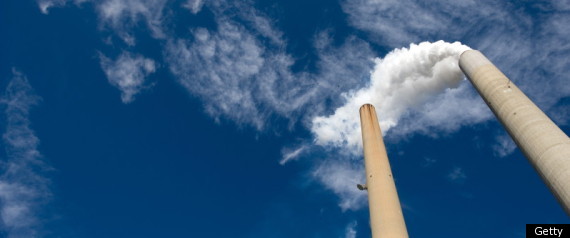 The U.S. Environmental Protection Agency's announcement yesterday that it will miss a Sept. 30 deadline for issuing new rules on greenhouse gas emissions has sparked an increasingly familiar pair of contrasting reactions: livid criticism and loud cheers.
The U.S. Environmental Protection Agency's announcement yesterday that it will miss a Sept. 30 deadline for issuing new rules on greenhouse gas emissions has sparked an increasingly familiar pair of contrasting reactions: livid criticism and loud cheers.The agency's latest postponement comes on the heels of last month's decision by the Obama administration to put off new ozone standards. And Sept. 30 won't be the first deadline the EPA has missed for greenhouse gases; a July deadline was also not met.
Experts warn that any further delays in air pollution regulations for power plants could deleteriously affect public health, given the known direct health effects of pollutants such as ozone and black carbon, as well as the indirect dangers of greenhouse gases such as climate change-driven rises in heat stress, infectious disease and extreme weather events.
"For a healthy economy, you have to have healthy people," Elizabeth Martin Perera, a public health expert with the nonprofit Union of Concerned Scientists Climate and Energy Program, told The Huffington Post.
Of course, environmental concerns are at stake as well. "Every day that climate emissions go up, we're endangering the planet further. Once in the atmosphere, these emissions are long-lasting," David Goldston, director of government affairs for the Natural Resources Defense Council, told HuffPost. "So the longer we wait, the greater the likelihood that there will be greater environment and health consequences."
Under the Clean Air Act, the EPA is required to regulate carbon dioxide and other greenhouse gases -- if the agency determines that they pose a danger to human health. EPA experts found that to be the case.
The EPA acknowledges its responsibility of moving forward with the regulations. According to Betsaida Alcantara, a spokesperson for the EPA, greenhouse gas standards are still on their way. She told HuffPost in an email that a new schedule will be announced "soon" and that the agency will consider all information as they "develop smart, cost-effective and protective standards."
Of course, the "cost" piece remains intensely controversial: Industry figures continue to say new regulations would be economically damaging.
"This announcement, as well as President Obama's recent request that E.P.A. withdraw the ozone standard, makes one thing clear: not only will E.P.A.'s barrage of regulations cost hundreds of thousands of American jobs, they may cost President Obama his own job, and he knows it all too well," Senator James Inhofe, an Oklahoma Republican and outspoken climate change skeptic, told The New York Times.
But Mark Jacobson, a greenhouse gas expert at Stanford University, disagrees. "The EPA is well aware that controlling air pollution has a benefit-to-cost ratio of about four to one," he told HuffPost. "It's detrimental to delay. It's costing people more money through taxes and health insurance."
Not only will climate change bring more unhealthy heat, extreme weather and disease, Jacobsen said, higher temperatures will exacerbate levels of other air pollution such as lung-damaging ozone.
A study published in February by Political Economy Research Institute at the University of Massachusetts Amherst concluded that "new air pollution rules proposed for the electric power sector by the Environmental Protection Agency will provide long-term economic benefits across much of the United States in the form of highly skilled, well paying jobs through infrastructure investment."
Specifically, researchers found that investments could create an estimated 1.46 million jobs between 2010 and 2015.
And on Wednesday, the Federal Energy Regulatory Commission told congressional Republicans that U.S. power plants are capable of complying with new environmental rules without raising electricity costs or stifling job creation.
Jacobson said there is historical precedent for such optimism: the aftermath of the Clean Air Act Amendments of 1970. "The auto industry complained that they would cost them money, but in fact they just invented the catalytic converter," he said. "And, as a result of that, not only did the air become cleaner, but sales never went down and the gross national product of the U.S. went up."
Still others don't see the postponement as either surprising or important. "We've known for a while that they just wouldn't be able to do this," said Jeff Holmstead, a former EPA official now at law firm Bracewell & Giuliani. He noted that the group of EPA experts working on this rule are the same ones dealing with a long list of pending coal-fire power plant regulations.
"While greenhouse gas emissions are a sexy subject, it's not as important as other rules," he added.
If the EPA's goal is to shut down old power plants, he suggested that the rule would fall well short given specific limitations under the Clean Air Act. On the other hand, he said that the EPA could win significant greenhouse gas reductions indirectly through a separate set of Clean Air Act regulations, such as regulations focusing on mercury pollution. These pending rules, which have a court-ordered deadline of November 16, would impact the same polluters that emit greenhouse gases.
"We feel it is important that EPA takes all the time it needs to craft this rule because it's an extremely complex issue, one that is global in nature and can't be solved within the borders of the United States," added Pat D. Hemlepp, director of corporate media relations for American Electric Power, in an email to HuffPost.
Such patience is not so easy for everyone. "We've just had such an onslaught of attacks in the House," said Perera. "The ozone decision started a very dangerous trend. We need to see Obama stand strong on this and to give the EPA the backing that it needs."
Origin
Source: Huffington
No comments:
Post a Comment